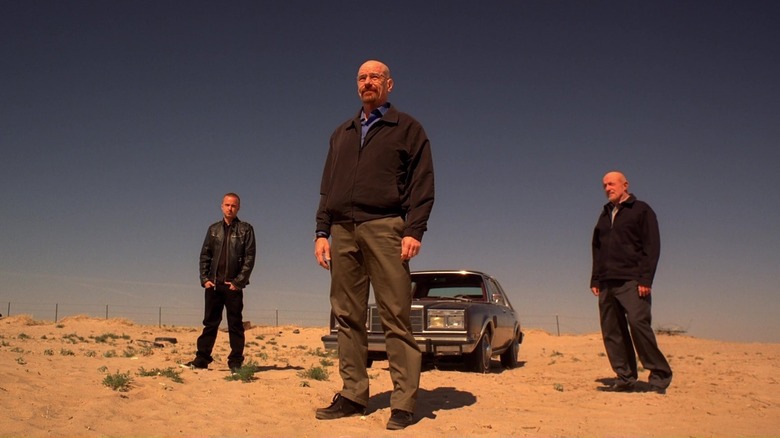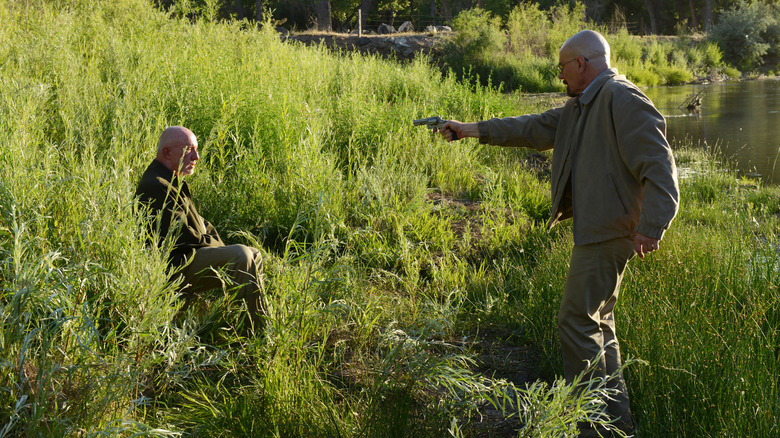This Breaking Bad Moment Finally Pushed Bryan Cranston To No Longer Protect Walter White
A little over 10 years ago, "Breaking Bad" officially aired its final episode and wrapped up one of the all-time greatest shows of the 21st century, one that would define much of the "Peak TV" era while continuing a tradition of viewers' fascination with morally-ambiguous antiheroes on television. All throughout the show's five brilliant seasons, Bryan Cranston's steely performance as Walter White continually dared viewers to tiptoe further and further past the limits of what they'd ordinarily be comfortable accepting from a protagonist. By the time the final season rolled around, however, Cranston himself could no longer remain sympathetic to his character's cause. One moment in particular represented that point of no return.
/Film's Devin Meenan put together a wonderfully extensive oral history of how this unforgettable final stretch of episodes came together, in which he carefully documented everything from the writers' struggles to move beyond the shadow cast by Giancarlo Esposito's Gus Fring to planning out one of the show's most thrilling set pieces ever: the great train heist. But it's what happened after that, when Walt and Jonathan Banks' Mike Ehrmantraut finally come to blows, that forever altered our perceptions of the depths Walt was truly capable of. (Some of us recognized that as early as season 2, when Walt callously and monstrously allowed Jesse's girlfriend Jane to die out of self-preservation, but I digress!)
Late in episode 7, titled "Say My Name," Mike angrily scolds Walt about all of his egotistical and arrogant actions that led to their desperate situation now, with the DEA hot on their heels and a frantic power vacuum left by the murder of Gus Fring. In typical Walt fashion, he overreacts and fatally shoots Mike just to regain his sense of power ... and not even Cranston could defend him anymore.
One step too far
The real trick to making "Breaking Bad" work was the impossible balancing act of keeping Walt just sympathetic enough to keep viewers engaged, even as he manipulated and schemed and murdered his way to the very top (er, bottom?) of New Mexico's criminal underworld. Yet even that came with a built-in expiration date once the writing team crept closer and closer to Walt's most unforgivable acts. And once you've lost the actual performer behind the character, whose literal job it is to find the humanity and relatability behind even the most villainous of people, that's how you know you done messed up.
/Film's Devin Meenan dug deep into the "Breaking Bad" archives and unearthed an intriguing comment from AMC's writers' room reunion in 2018, in which writer/producer Moira Walley-Beckett recalled the moment she witnessed Bryan Cranston finally open his eyes to reality:
"Bryan, the man who was the character of Walt and had been protecting the character fastidiously, repeating the lie of the character in order to play the character, and he was in a moral crisis as a person and an actor and the man who played Walter White when he killed Mike. And I watched Bryan go through that where he couldn't protect the character anymore and he had to start accepting the darkness within and it was very hard for him."
For those wondering why it took this long to come to terms with his own character, it's worth noting that much of Walt's darkest impulses could at least be traced back to somewhat justifiable motivations. But unlike, say, poisoning the child Brock or orchestrating Gus Fring's murder or wiping out all of Mike's men in prison, shooting Mike was as selfish and petty as it gets. 10 years later, we're still mad about it!

